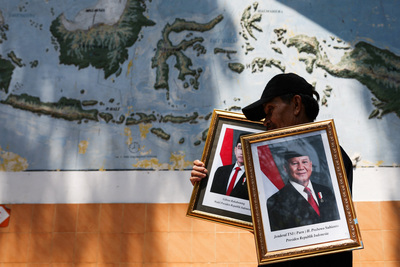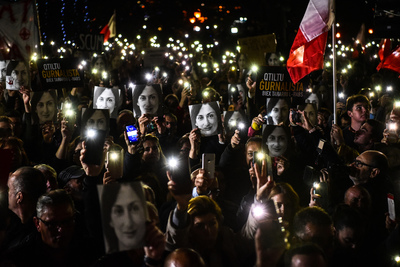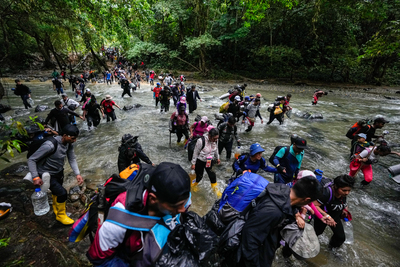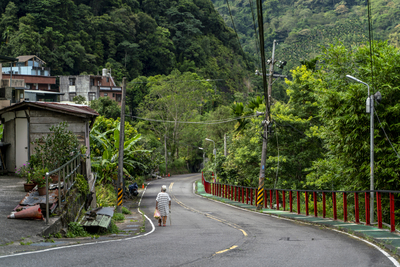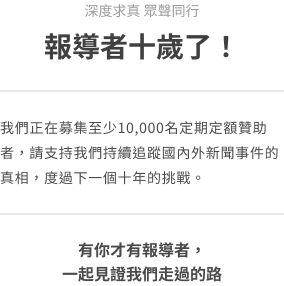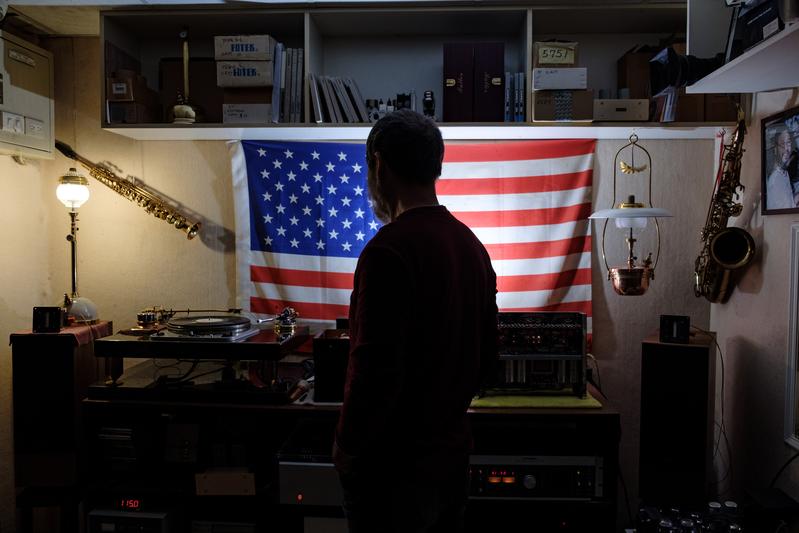
"When people see me, they always ask 'Who's your father? A foreigner?' or they would say 'you look so handsome and different'. But I'm Taiwanese, just my dad was in the U.S. army - he left."
Lin Yili (林毅力) took his last name from his mom's Japanese husband, who had fled to his home country after World War II; and his first name was a translation of his English nickname. Neither his first nor last name belongs to him. Like a yellowed bookmark sandwiched between some heavy pages for the sake of recording traces of history, his life belongs nowhere.
Rectifying his own name is almost impossible: neither the district office nor the city government offered help. Even the court demanded his non-existing birth certificate as a precondition for assistance.
Lin, 64, who requested to use a pseudonym for privacy, was a child left by an American soldier during the Cold War. He has spent his whole life seeking for and proving that his American father had once existed in this world.
In Taiwan, there are an estimated 1,000 Amerasians with backgrounds like Lin Yili. Their lineage is lost with their father's unknown identity. The DNA of these "half-Taiwanese" not only appears in their prominent facial features, but also hides within their blood for generations to carry on.
It has been 40 years since the United States broke formal diplomatic relations with the Republic of China (ROC), but these aging mixed-race Taiwanese are still fighting for their dignity.
For Lin, his father's identity is the biggest enigma.
Since his 30s, Lin has sent a "missing person notice" through the Ministry of National Defense (MND), the American Institute in Taiwan (AIT), and other organizations. Whether he was driving a taxi or as he spends his time now running a stereo shop, he never gave up on asking his customers about any potential information on his father's whereabouts.
The search has taken Lin over 30 years and the journey has not come to an end.
As we entered Lin's stereo shop, we were greeted by an American flag hanging from the ceiling, its bottom almost reaching the ground. And with Lin's gray beard and chiseled features, we were briefly teleported to the United States. But as soon as he spoke, and nonchalantly delivered a natural "motherfucker" in perfect Taiwanese Hokkien accent, we were pulled back to the traditional Taiwanese market.
"When people see me, they always ask 'Who's your father? A foreigner?' or they would say you look so handsome and different. But I'm Taiwanese, just my dad was in the U.S. Army - he left," Lin said, having to repeatedly answer the same questions from strangers.
High cheekbones, voluminous hair, and a tall nose are all considered attractive features today. In the 1960s, however, these physical features stood out as an unforgivable dissonance in Taiwan.
According to Lin, his mother had married a Japanese businessman for money, but he left Lin's three siblings behind to flee back to Japan as soon as his country lost the war. To feed the family, Lin's mother worked any job she could find. Around the time of the Korean War, large numbers of U.S. troops entered the Tainan Air Force base to take advantage of Taiwan's strategic location. The American liquor, cigarettes, and army supplies that spilled from the U.S. Army's commissaries were like sweet seductions. "Apple, Rémy Martin, and Whiskey" instantly became synonymous with imported goods, providing a sensory stimulation for the Taiwanese society.
Black market trading started to gain popularity. For the sake of earning money, Lin's mother was a frequent participant and had been arrested numerous times at these markets. It was during that time when she met Lin's father, an American who came to Tainan with the Military Assistance Advisory Group to provide military training. The American man was already married before he was dispatched to Asia, but his foreign love affair birthed Lin as an evidence of that relationship.
The historical backdrop for these Amerasians was the decades of political and military confrontation between the United States and the Soviet Union, which influenced the entirety of global development. From the 1950s onward, the Cold War's influence gradually reached the Asia Pacific: first the Korean War, then the Arab-Israeli conflict, the Vietnam War, and the Soviet-Afghan War. The U.S. army had swept through the Philippines, Vietnam, Korea, Okinawa, Thailand, and even Taiwan; wherever they went, they brought along the warfare and left behind the Amerasians with Asian mothers.
After the Mutual Defense Treaty between the United States of America and the Republic of China was established in 1951, the U.S. Military Assistance Advisory Group was one of the first official American military presence in Taiwan. Since the army, the navy, and the air force all have their own advisory groups, the U.S. Army left their footprints in all parts of Taiwan. In the few years after 1951, more American armed forces relocated to Taiwan, coinciding with the increasing tension of the Vietnam War. The Rest and Recuperation Program also encouraged more American soldiers to visit Taiwan while they were on their leaves. In addition to the 10,000 U.S. armed forces stationed in Taiwan, around 40,000 more American soldiers visited the island on holidays. The increase in American presence led to a rapid increase in biracial births as well.
In 1965, the U.S. Army established the Rest and Recuperation Program (R&R), selecting places like Singapore, Hong Kong, Bangkok, Manila, and Taiwan to set up as vacation destinations for American soldiers who were on leave from the Vietnam War.
The tourism industry, along with bars, recreational businesses, as well as the sex industry saw rapid growth as a result. The area near the Ching Chuan Air Base in Taichung was once called the "Dirty Area"- there were musical restaurants like Blue Angel and Monte Carlo, and eventually, four bars, 10 hotels, and 14 more restaurants and spas were opened.
In the two years after the R&R Program was established, Taiwan accommodated a total of 69,779 visiting American soldiers, according to the Tourism Council's statistics in 1965. Aside from army wages, each soldier received US$125 as a holiday compensation. If every soldier spent US$200 on average, Taiwan would have received NT$500 million from the tourism sector in two years. businesses thrived from the influx of tourists, and more young women started working in bars to earn American dollars in exchange for a better lifestyle.
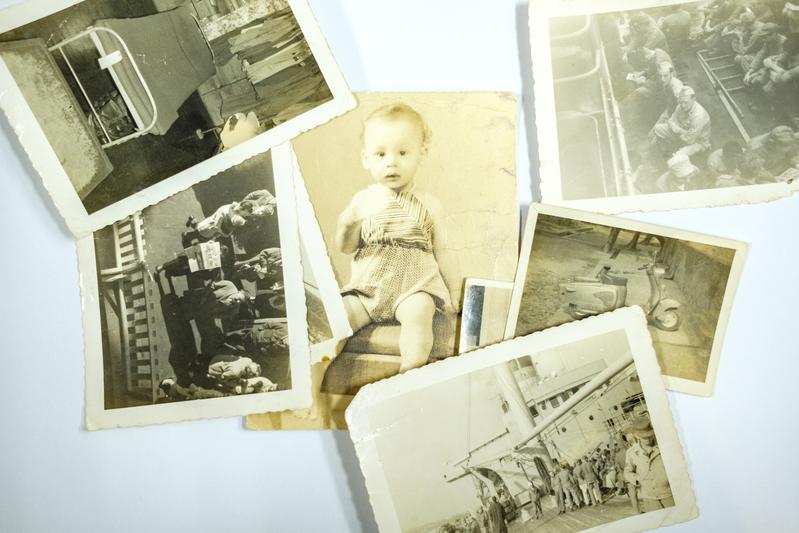
Lin, with much paler skin than his two half-siblings, inherited the same Japanese last name from his mother's ex-husband. Although the three children lived under the same roof, Lin's siblings could only ever call their mother "auntie" when his American father was around. They were only seen as some children left behind by his mother's relatives.
"I don't know if my older siblings hate me, but my older brothers have never called me their younger brother for decades. Only recently did one of them finally introduce me as his younger brother at a wedding," Lin says.
Even his own family had a hard time accepting him as a biracial person, not to mention the rest of the society.
"My appearance is an imprint, like how the prisoners in the past had tattoos on their faces to remind other people of their crimes. But what crime did I commit? I was simply born, but I've had to deal with discrimination my entire life," Lin says. This face cannot be removed or washed off, he says. The nicer nicknames were like "American boy" or "big beard" while some people have mocked his lack of English skills or called him a "mutt."
When Lin was younger, he often got into fights because he could not stand the humiliation. He says he was always the subject of mockery whether he was simply having a meal or refueling his motorcycle at the gas station; and people were always shocked whenever he spoke in fluent Taiwanese Hokkien.
"It's not a problem only for myself - my son also has a mixed-race appearance. He used to ask me why, I only told him, 'people only say you look like a foreigner because you're handsome,'" Lin says. The legacy his American father left behind, he says, has become a heavy burden for the entire family.
When the Taiwanese economic boom was still in its infancy, Lin already owned a refrigerator and a television at home, with an abundance of big apples for him to enjoy. His father, after leaving Taiwan, sent his mother a US$100 monthly allowance for several months. However, in the end, he reunited with his family in the U.S. and disappeared from Lin's life.
"I have nothing to hide - I was a son of a mistress, a byproduct of the Cold War. On what grounds should I even fight for my own existence?" Lin says. To the entire era, he is nothing but a small disturbance, a misplaced package that has lived until this age, he says. If he could see his father in his lifetime, he would first slap him twice, then give him a big hug. Lin thinks that, even in death his father shall not evade his responsibilities for the existential crises and social isolation bequeathed to his son.
Different from the other Amersians who had already given up on seeking for their fathers, Lin persists with his dream of finding his root. He hopes the decades of tragedy will end with him.
"It's hard to say whether the price of the Cold War is right or wrong, but if my quest can end on a good note, it will be the best ending to my life," Lin says.
In his 60s, Lin still has the motivation to keep searching, but his footsteps are slowing down. With four coronary stents placed near his heart, Lin has no idea when his life will come to a halt. The history of his background has started to freckle like the yellowed photographs stored in the paper bags.
For over 30 years, Lin has tried to search for his father through his network of customers. A few months ago, he finally ran into a stereo shop customer who connected the dots for him. He found Lin's father, Edward Goldsby, and his location in Franklin, Indiana.
But Goldsby might already be resting in the Forest Lawn Cemetery, numbered 18098777.
A Google Map search for Franklin was the closest Lin has ever come in contact with his father in half a century . The only distance standing between Lin and his roots was the slightly heated computer screen, as if a hint of warmth has lingered from fragments of the past.
White babies. Black babies. Yellow babies. And red babies. Wherever the U.S. Army has set foot in, a variety of mixed-race babies were left there.
The Taipei Pearl S. Buck Foundation (台北賽珍珠基金會), an organization dedicated to supporting Amerasians, estimated that the earliest Taiwanese Amerasian births dated back to around 1952. Those babies, like Lin Yili, are now around 65 years old. The last American soldier had left Taiwan on May 3, 1979, and the last group of Amerasians were born around that year; they would have been 40 years old now. Chiu Han-Chung (邱漢忠) was among the last generation of Amerasians born in Taiwan.
Chiu's mother was a 17-year-old Atayal (a Taiwanese indigenous group) teenager when she met his father. Only bits and pieces of information about Chiu's father are retained: air force, munitions systems specialist, stationed in Taichung's Ching Chuang Air Base. The only confirmed detail was that Chiu's parents had gone to court against each other, leaving a 1975 ruling from the Taichung District Court.
The ruling only mentioned Chiu's father as "Alan", without a last name or age or any details regarding his rank and post. Chiu's mother was sentenced to six months in prison with two years of probation because of theft. The reason for her sentencing was recorded:
"I live with Alan, but he wouldn't even give me any allowance. When I fought with him, I told him I would sell our things if he refuses to give me money."
While Alan went to work one day, Chiu's mother stole his stereo speakers, carpets, and an electric blanket and sold them for NT$4,600. The judge even wrote the following comment in the ruling:
"The defendant had dropped out of middle school to work in a foreign place. She had decided to live with an American soldier because of material temptations and vanity, yet he has never given her a dime during their cohabitation. The defendant has committed a crime out of anger, in which her case deserves sympathy."
After the Nixon Doctrine was announced and the U.S. armed forces were retreating from Asia, the number of vacationing American soldiers decreased along with Vietnamization; the stationed forces also slowly withdrew from Taiwan. Chiu was born around then, and only mysteries remained when his father left Taiwan.
Underage and pregnant before marriage, Chiu's mother was married into a Hakka village in Miaoli under her family's furious pressure. Chiu had a stepfather, a last name, and a household registration, but these factors did not make his life easier. A 40-year-old record from the Taipei Pearl S. Buck Foundation shows that Chiu's stepfather refused to accept a stepson with dark skin and curly hair, and that he could not resolve religious differences with Chiu's mother. Within four years of their marriage, Chiu's mother suffered from depression and hallucinations.
"My mom closed herself off like the maingate that was shut at the air force base. Sometimes she could recognize me, sometimes not, and then she started to burn all the letters and photos related to my dad," Chiu recalls.
The Joint Communiqué of the Establishment of Diplomatic Relations of January 1, 1979 established diplomatic relations between the United States and China. The United States officially recognized the People's Republic of China as the sole legal government for China. Within this framework, the United States promised to maintain cultural, commercial, and other unofficial relations with Taiwan.
The breaking of Taiwan-United States diplomatic relations sparked public outrage. Nationalist protesters flooded the streets, and anti-American sentiment impacted Chiu's mother as well. Chiu and his mother were forced to move back in with his grandparents, but he was not accepted by his tribe and relatives because of their prejudice against his skin color.
Young Chiu Han-Chung was described as follows:
"Because of his black appearance, Chiu was seen as a monster in his village and school, causing his psychological imbalance and an abnormal development of personality. He dropped out of elementary school during his first grade, and started wandering and begging on the streets." - Interview File from The Pearl S. Buck Foundation in Taipei, 1983
When Chiu turned seven, his tribe could not withstand the gossip surrounding his background any longer and asked a priest for assistance. He helped send Chiu to the Fu-An Orphanage in Taipei(台北福安育幼院) along with other mixed-race children.
"I was only seven. Why did they abandon me alone here?" Chiu says and sighs. Before attending school, he had thought he was just a Taiwanese like everyone else. He had only realized his differences when his classmates and relatives kept repeating, "You're black, and you're the son of a black man."
Physical scars are the most obvious evidence of the discrimination against him. Chiu's right hand has a scar stretched between his thumb and index finger, about four to five centimeters long - it was cut with a piece of glass by a middle school classmate. He can barely recall how many times he had clashed with others by then. While growing up, he was never absent from dangerous behaviors like car racing, fighting, and gang shootout. Hatred has determined a life path for him, straight to the end like the fireworks, short but vibrant.
"I was taken back to the Hakka village after middle school, and then I went to study electronics in a vocational high school. I was stuck among Hakka culture, aboriginal culture, and Taiwanese culture - I belonged nowhere. You know when I felt the most comfortable? Surprisingly, in the bars hanging out with the pure Blacks," Chiu says. He describes himself as a human ball being kicked around without anywhere to go. His heart was filled with anger and hate, questioning why he was born a mixed race, having no options in life.
Chiu emphasized that the Pearl S. Buck Foundation was the most important in providing psychological guidance to lead him back on the right track. Many Amerasians like him did not overcome discrimination or the difficulty of societal rejection. One of his female friends has allegedly committed suicide after finding out her mixed-race background, and he has never heard about her since.
After he left the army, Chiu followed the footsteps of the average people: work, get married, and have children. His marriage did not last past the honeymoon period, and he was left with three daughters after the divorce. His eldest daughter is now in high school, facing the trauma of racism like he once did.
"My daughter, like me, is always being asked why she looks so dark. She can't accept herself, and her friends can't accept her either," Chiu says. To him, skin color has become an unshakable barrier. It is as if one is being locked in a transparent box, he says, and that is the biggest tragedy for Amerasians. He always comforts his daughter by calling her a special black pearl, and says, "Other people wish they were tan too!"
Chiu's mother can never walk out of her shackles, and his stepfather passed away just a few years ago. He says it is much easier to love them than hate them now. "Because everyone involved in this did not have a better choice," he stresses. By reading the bits and pieces from the past, Chiu tries to piece together his father's face, hoping to end the racial stigma with his generation.
Without an American citizenship and the knowledge of his father's full name, Chiu did not get very far trying to seek help from the MND and the AIT. Aside from receiving responses like "we regret to inform you we were unable to help with your request," he has also been mocked frequently.
"When I search for the fragments of history, I'm not looking for any rewards - I only want to know who he is and how he looks like. Once I find out, my life will seem slightly more complete," say Chiu Han-Chung.
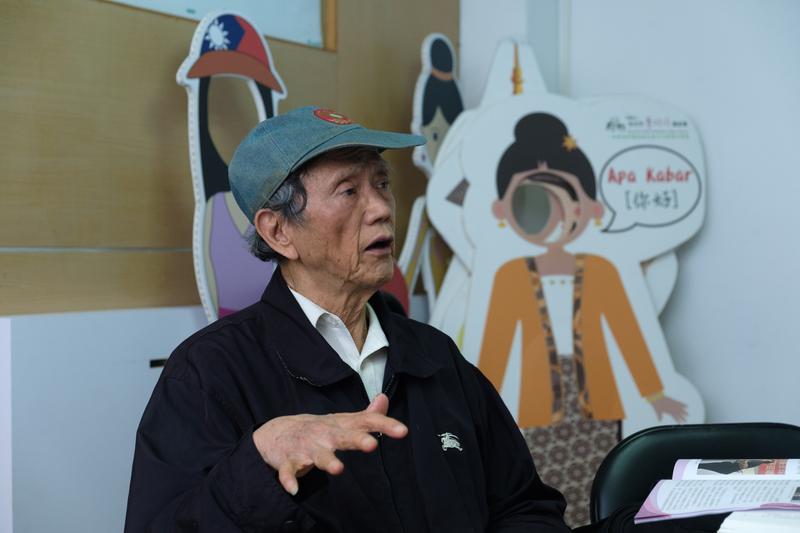
The Taipei Pearl S. Buck Foundation Chairman Yu Ying-Fu (尤英夫) pointed out that around 1,000 Amerasians were born since the 1954 Sino-American Mutual Defense Treaty, which invited tens and thousands of American soldiers to Taiwan.
"It's a global problem. Until today, Amerasians in many Asian countries are still looking for their biological fathers," Yu says.
In addition to Taiwan, the United States Pearl S. Buck Foundation estimated in 1983 that over 1,200 Amerasians in Korea were born since the Korean War, and over 3,500 in Vietnam during the Vietnam War. According to the latest statistics, there is a total of 17,521 Amerasians in the world, but many of their stories have become untraceable.
In the U.S. Pearl S. Buck Foundation's headquarters, Yu says, a wall filled with the portraits of half-Filipinos still stands, and these people have never found out who their fathers were.
The phenomenon of Amerasians is not only the romantic consequence from a foreign love affair, but many of them are tragedies birthed by illegal sexual assaults.
In the past, Taiwanese government and its judiciary system had mostly ignored the problems raised by Amerasians. Since Taiwan was receiving US$100 million in economic aid and infrastructural assistance from the U.S. annually, the Taiwanese government was reluctant to voice its concerns. If the U.S. Army had committed crimes like rape and battery, they were excused because the embassy possessed judicial immunity until the Status of Forces Agreement with the Republic of China (《在華美軍地位協定》) was signed in 1965. Under the precondition of notifying the U.S. government of its jurisdiction withdrawal, the Taiwanese government was granted discretionary power over serious crimes like threats to the ROC's national security, murder, robbery, rape, arson, as well as the illegal possessions and sales of arms.
As the Vietnam War became increasingly heated, the number of U.S. armed forces stationed in Taiwan continued to rise. According to the Ministry of Foreign Affairs (MOFA), the number of American soldiers had climbed from 3,000 to over 7,000 since 1965, and at its peak, there were close to 10,000 of them stationed in Taiwan in 1968. Meanwhile, in the span of two years, Amerasian births shot up from the annual average of a dozen to over 30.
The truth hidden behind the surge in Amerasian births after 1965 was caused by a spike in sex crimes. Taiwan's National Archive Administration revealed that in 1966, MOFA had created a file accumulating over 300 sexual offense cases against the U.S. army, all of which resulted in out-of-court settlements without prosecution. In a MOFA petition written by Chien Fu ( \錢復), former head of the Department of North America Affairs, the government's evasive attitude was evident.
September 8, 1969 For the rape cases committed by US soldiers, our government has always given up jurisdiction, allowed both parties to settle with compensation for the victim, and transferred the offender back to the U.S. Army. Based on political reasons, our government has abandoned the judiciary right over these matters since they would have caused public outrage if taken to court. Our citizens are sensitive to sexual offense cases, especially the ones related to US soldiers assaulting our citizens. The Chinese Communist Party and other criminals could use these cases to alienate the friendly relations between our citizens and the U.S. Army. Additionally, our domestic legal penalties for rapes are less severe than those of the U.S. Military Law. Based on the above analysis, to avoid unwanted consequences, this case should be sent back to the U.S. Army like the previous instances and should not be withdrawn.
In the book A History Lost Beneath Skin Colors (《失落在膚色底下的歷史》), the Taiwanese court gave up its jurisdiction over a multitude of criminal offenses considering the risk of losing the U.S. economic aid. The MOFA files almost never mentioned how and if the defendants were convicted in the end, and the truths were buried with the missing information.
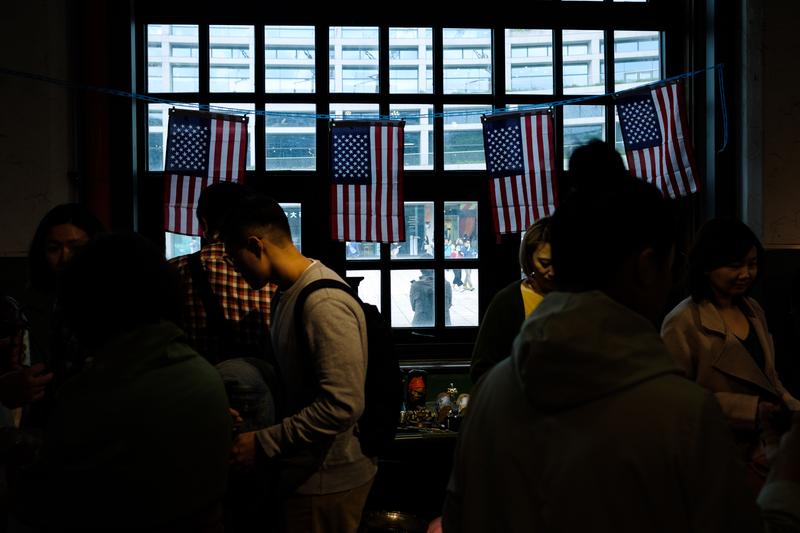
To admit its responsibility for Amerasians, the U.S. government passed the Amerasian Homecoming Act in October 1982, allowing the immigration of Amerasians born in Korea, Vietnam, Cambodia, Thailand or Laos after 1950. And to qualify for immigration, Amerasians would have to obtain the financial guarantee of a U.S. citizen. Only Taiwan and Okinawa are still excluded from this act to date.
Amerasians from Taiwan were never accepted by the U.S. government. Previously dubbed "orphans without nationality (無國籍孤兒)," these Amerasians even had a hard time acquiring their identification in Taiwan itself. The Taipei Pearl S. Buck Foundation President had spent years to finally persuade the Ministry of the Interior to revise its outdated Nationality Act in 2000. The ministry had amended the law to allow citizenship by descent if either parent is Taiwanese, instead of requiring the father to be a Taiwanese citizen, thus resolving the nationality problem for the Amerasians who could not locate their American fathers.
"This is the best our government can do," said Feng Hsien-Mei (馮閑妹), former chairwoman of the Taipei Pearl S. Buck Foundation. In her 80s, Feng had dedicated her life's work to mentoring Amerasians in Taiwan. Recalling her journey of helping Amerasians seek for their parents, Feng said that only fewer than 10 people out of several hundreds were able to reunite with their fathers successfully. She emphasized that the U.S. Army was unsupportive along the process, and the U.S. Pearl S. Buck Foundation disapproved of widespread media coverage in Taiwan in order to avoid further complications internationally. These factors, combined with the Taiwanese government's weak diplomatic position, contributed to the failures in Amerasians' family search.
In almost 40 years of her visits to Amerasian families, Feng said she could never forget a middle school Amerasian once said he wanted to kill his mom for having given birth to him.
Feng said she could imagine how much pain the Amerasian children have felt from their biological family. Most of them think they do not belong to this society, and they would have a hard time escaping from the anxiety arising out of discrimination. Even with impressive accomplishments and appearances, Amerasians would still live with the regrets of their incomplete parentage.
Close to 50 years of geopolitical confrontations during the Cold War era created a long-lasting impact on the Asian continent, leading each country in separate directions. Even as the Cold War ended, the shadows of the proxy wars never ceased. The remnants of warfare washed us offshore before we even planted our roots on the island. The stories of those Amerasians searching for their missing fathers might vanish from the island within the next 20 years, but the mixed-race imprint and the price of war will run through the veins of these families for centuries to come.
※This report was produced by a collaboration between The Reporter and Radio Free Asia Chinese Division. We sincerely thank Chen Chung-Hsun, the author of A History Lost Beneath Skin Colors, and the Taipei Pearl S. Buck Foundation.
(To read the Chinese version of this article, please click: 西方的臉孔在東方悲鳴──亞美混血兒長達30年的尋親啟事 )
深度求真 眾聲同行
獨立的精神,是自由思想的條件。獨立的媒體,才能守護公共領域,讓自由的討論和真相浮現。
在艱困的媒體環境,《報導者》堅持以非營利組織的模式投入公共領域的調查與深度報導。我們透過讀者的贊助支持來營運,不仰賴商業廣告置入,在獨立自主的前提下,穿梭在各項重要公共議題中。
今年是《報導者》成立十週年,請支持我們持續追蹤國內外新聞事件的真相,度過下一個十年的挑戰。




